- Home
- L. A. Weatherly
Broken Sky Page 5
Broken Sky Read online
Page 5
Collie stopped talking, and after a beat I realized that this was all he was going to say. “I don’t understand,” I said blankly. “Are those supposed to be reasons?”
“No, there were other things, too.”
“Like what?”
“Like…I really don’t want to do this, Amity.”
“Do what? You disappeared for four years without a word! Where did your family go? I never even knew that much!”
His face had closed. “It doesn’t matter.”
“Of course it matters!”
Collie took his arm from my shoulders and cleared his throat. “Look, I didn’t know you were going to be here. This is all—” He broke off, his jaw tense. “I could spin you a line about why I didn’t get in touch,” he said finally. “Let’s just say I had my reasons and leave it there, all right?”
He sat leaning forward with his head down, hands linked together between his knees. His hands were a man’s hands now, not a boy’s. I stared at them, my chest hurting with everything I wanted to say. Dad died, and then you left and it was like you’d died, too. Collie, I haunted the mailbox every day for months, and there was nothing…
I stood up. “We can leave it wherever you want,” I said. “We won’t be talking much anyway.”
He glanced up with a surprised frown. “We won’t?”
“No. It’s very easy to not talk to people here.”
Collie started to say something else and then stopped. He looked off down the road with that same troubled expression and rapped a fist against his palm.
“Yeah,” he said at last. His voice was flat. “That’s probably for the best.”
Chapter Five
The doorbell rang at exactly the time Kay had expected. She glanced in the mirror, tensely patted a curl into place, then put on a bright smile and swung open her apartment door. A man in a fedora hat and pinstriped suit stood in the hallway. On his lapel was a small silver Taurus pin.
“Did you bring your dance shoes?” asked Kay in a clear voice.
For a second the man stared blankly. Kay widened her eyes at him, and he swallowed. “Yes – yes, of course.” He patted the briefcase under his arm. “Right here.”
She ushered him in, first glancing up and down the hallway. The other apartment doors were all closed.
Once inside, Kay quickly locked her door and put a vinyl disc on the phonoplayer. Dramatic tango music poured from the trumpet-shaped speaker. She twisted the blinds shut against the orderly brownstones that lined the Topeka street, and the slanting bars of sunlight that had fallen across the room vanished.
“You told me on the phone it was urgent,” Kay said, her smile gone. “You know, Mr Hearn, I don’t usually see people unless—”
“No, please! You’ve got to help me.” Mr Hearn pulled off his hat and sank into a chair at her consultation table. “Look, I’ve got them right here.” He opened the briefcase and took out a large brown envelope. He hesitated as he studied Kay. “You’re very young.”
She raised an eyebrow and sat across from him. “I’m nineteen. You’re welcome to find someone older.”
He winced. “I had a hard enough time finding you.”
He handed over the envelope. Hearn Family, read the lettering on its front. The rubber-stamped date – November 22nd 1940 – was from the most recent sweep, only days previously.
Kay studied it. “You stole this from a state astrologer?”
Her client shifted uneasily. “Let’s say ‘borrowed’. Can you tell me if my family’s in danger?”
“Yes,” said Kay.
There was a pause. Mr Hearn frowned. “Well, will you tell me?”
“I just did,” said Kay, patiently. “Look.” She pointed at a small, pencilled mark on one corner of the envelope: a circle with a jagged line through it.
“That shows that someone in the family has been found Discordant,” she said. “It saves the sorters from having to check each family’s charts when they come in.”
Mr Hearn went rigid. He stared at the circle with its lightning-bolt slash. Kay knew what he was thinking. A few years ago, being made Discordant meant having to wear a “D” on your clothes and losing some of your civil rights. But now Sandford Cain, with his bland face and pale eyes, was handling the Discordants.
Neither Kay nor Mr Hearn said the words “correction camp”.
Kay took an eraser and carefully rubbed at the mark. The circle with the jagged line faded. “This will buy us a little time.”
Mr Hearn’s knuckles were white. “There must be something you can do,” he said tightly. “Please.”
Kay slid out the birth charts. Each showed a circle divided into twelve parts, or “houses”, with one astrology sign per house. Kay always imagined a snapshot of the heavens taken the moment someone was born, with the astrological wheel then superimposed over this. Numbers and symbols showed which astrology signs the sun, moon and planets were in at birth and to what degree. At the charts’ centres, geometric shapes showed the unique, complex ways the planets interacted for that person.
Or would interact, thought Kay, if any of this were true. Astrology might be intricate to master, but only fools believed in it.
She examined the charts, and tapped the one labelled Margie Hearn. “This one’s the problem.”
Mr Hearn made a small, strangled sound. “My daughter,” he whispered. “She’s ten.”
“Well, they’ll have found her Discordant anyway. She’s got Pluto in the seventh house, plus her ascendant is Aries. That shows a subversive attitude towards—”
Mr Hearn’s voice rose to almost a shout. “Subversive? She’s ten! Seventh house, ascendant – what is this crap; what’s it got to do with Margie?”
Kay’s glance was almost amused. “Oh, dear. Haven’t we been paying attention in our astrology classes?”
Her client blanched as he realized his blunder. All citizens were required to study basic astrology, “to preserve our harmonious society”.
“Don’t…don’t report me,” he said.
Inwardly, Kay shrugged. Even with perfect stars, you could be found Discordant. But the black market was where the money was, not reporting people who were supposedly a threat to Harmony.
“My goodness, I wouldn’t dream of it,” she said mildly. She studied Margie’s chart again. “The ascendant’s the sign that was rising on the eastern horizon at birth,” she added. “Your outward personality. Your daughter’s sun sign is Libra, but Aries rising means she comes across more like an Aries.”
Mr Hearn swallowed. “And…that’s supposed to be bad?”
“Depending on a chart’s other elements,” said Kay. And on whatever new ideas President Gunnison had gotten into his head.
Every Central States citizen knew how Gunnison, once a poor farm boy, had “found himself” through astrology. In countless interviews he’d described his fascination on learning that astrologers had predicted the Final War – though those old predictions were so vague, thought Kay, that they could mean anything.
From the very start, Gunnison’s policies had been driven by the stars. Excited that astrology had also “predicted” their new country, people had at first embraced it with enthusiasm. The thought was hard to believe now. Kay’s clients all wore the same tense, desperate look.
But if you had the right contacts, there was a great deal of money to be made.
“All right, here’s what we’ll do,” Kay said. “I’ll recast your daughter’s chart. By the time they do another sweep, she’ll have a new birth certificate with a safe time and date.”
Cautious hope crept over Mr Hearn’s face. “You can do that? Put a new birth certificate in the record’s office?”
Kay smiled sweetly. “If you can afford it.”
He gave a terse nod. Kay took out a blank chart and her ephemeris. She noted Margie Hearn’s date and time of birth, then flipped through the thick book of planetary graphs.
A knock banged at the door.
Kay froze and looke
d up. In the background the dance music played on.
“Are you expecting anyone?” Mr Hearn whispered urgently.
No. She was not. The knock came again – louder, harder. Kay lunged from her chair.
“Coming!” she called.
She grabbed the ephemeris and shoved it back into her bookcase; the spine read Famous Quotations. She swept up the charts and jammed them into the envelope. She placed it on the rug. Trying not to let her hands shake she quickly rolled the rug into a tight cylinder, exposing polished floorboards.
“I’ve been teaching you the tango,” she hissed to Mr Hearn. Without waiting for a response she glanced in the mirror again, making sure her Scorpio brooch was visible, then smoothed out her skirt and went to the door.
When she opened it there were three Guns. They wore identical grey uniforms; their buttons gleamed. The red-and-black Harmony symbols were stark swirls over their hearts.
They shoved past before Kay could speak. “What’s wrong?” she cried. “I’m just giving a dance lesson!”
They didn’t reply. Mr Hearn stood in the middle of the room like a statue. One of the Guns held Kay’s arm in a painful grip; she watched in cold terror as the other two tore her home apart. Someone had tipped them off – or else her contact in the records office had been captured.
They found the ephemeris easily enough, knocking all the books from the shelf until they had it. Then one of the men flapped open the rug. The Hearn Family envelope fell out onto the floorboards.
The Gun’s lip curled. He picked up the envelope and glanced inside. “These are yours, I take it,” he said to Kay’s client. “Who’s the Discordant? You?”
Mr Hearn took a shaky step backwards, hands up. “I – please, I didn’t do anything wrong! I was just—”
The Gun reached for his holster. Kay had a confused second to register the blunt black shape of a pistol, and then a gunshot thundered. Mr Hearn collapsed to the floor, stumbling over the skewed rug. Red bloomed on his chest. He gasped: a terrible choking sound. Panting, he touched his chest – stared blankly at the blood on his fingers.
The Gun walked over to him. Mr Hearn looked up, his eyes round and panicked. “Please…” he whispered.
The Gun shot him again, in the head this time, and then kicked his lifeless body hard. Blood spattered across the floor.
“Discordant scum,” the Gun said.
Kay couldn’t move. Mr Hearn’s face had a hole in it. Part of his head was gone. Gone.
The Gun still held the envelope. Where the circle with the jagged line had been there was now a streak of blood. He put the weapon back in his holster and turned to her.
“So very sorry to trouble you, Miss Pierce,” he said coldly. “Come with us.”
They surrounded her in a small cluster as they strode down the hallway. Kay saw Mrs Lloyd peek out her apartment door, then quickly close it again. The vindicated look on her face was unmistakable.
Kay went taut. Had Mrs Lloyd been the one to report her?
Outside, the sky was very blue, the sidewalk spotless. One of the windowless grey “Shadowcars” waited at the kerb: tall, with rounded lines; a silver grille leered at its front. As the Guns shoved Kay into the van, passers-by avoided looking at her.
There were no seats. The cold metal space smelled of sweat and urine. When the Shadowcar began to move, Kay’s tense fingers closed around a pencil stub in her sweater pocket, along with a crumpled receipt. She pulled out both items and gazed at them, mind racing. She balanced the scrap of paper on her leg and began to write.
Finally the van stopped. When the doors swung open Kay saw that she’d been taken to the centre of downtown Topeka; the city of millions pulsed around them with its gleaming el-trains and streetcars and honking taxicabs.
Just in front of her was a stretch of lawn and a marble building she recognized as part of the Zodiac: the massive twelve-domed capitol complex that housed John Gunnison’s regime. Kay was unsurprised. Dread shivered through her.
The Guns yanked her from the van. They’d parked in front of the “Libra” building. Its broad white dome towered overhead as they hustled her inside. She was even less surprised to find out that there were jail facilities deep in the building’s bowels.
As she was pushed into a large cell full of people, Kay clutched one of the Gun’s arms.
“I have vital information about Gunnison’s Dozen,” she said, and pressed the scrap of paper into his hand. “It would be very worth someone’s while to listen to me.”
They left her locked up for over seven hours.
Kay sat hugging herself on a bench, feeling sick. From the low, frightened buzz of conversation, her cellmates were all black market astrologers, too. A few times someone was ordered out, and the whole cell went tautly silent at the distant sound of screams.
Finally Kay was taken to a small room near the cells. It held a plain wooden table, two chairs. The Gun who’d brought her left and locked the door.
Kay sat down gingerly. She stared at the walls. They had faint reddish-brown stains, and she had a sudden terror that she should have kept her mouth shut.
She waited, her imagination running rampant. Who would walk through that door? Sandford Cain? Gunnison’s chief right-hand man was known to be a violent thug. The correction camps he’d established in the far north were notorious. There were whispered rumours of prisoners forced to work in the snow until they froze to death, of secret midnight shootings in the woods, of anonymous graves piled high with bodies.
The door opened. Kay straightened with a jerk.
No, it wasn’t Cain…though the man who stood before her was in the news as often. Malcolm Skinner, the Chief Astrologer of Gunnison’s regime. He was thin and narrow-shouldered; his double-breasted suit was sharply creased.
Skinner dismissed a pair of underlings with a wave. As the door closed, he sat across from Kay. The look he gave her was dry as a bone. “Miss Pierce, is it?”
“Yes, sir.”
“You claim you have information about the Twelve Year Plan. I’d be very interested to know how.”
Kay swallowed. “Because I cast a chart showing the Plan’s ‘birthdate’ – the exact time and date of its inauguration,” she said softly.
When Gunnison first took power just under twelve years ago now, he’d announced the Twelve Year Plan: a scheme to bring boundless prosperity. How exactly he would do this was kept secret. Occasionally the press would mention that “Gunnison’s Dozen” was on track; that was all.
Casting this chart was forbidden even for state astrologers. At Kay’s admission Skinner’s gaze narrowed. He flipped through a stack of papers he was holding. His cufflinks showed the symbol for Capricorn.
“Talk,” he said, and shoved a paper her way.
The chart for the Plan. Kay started to give a wildly positive interpretation. Something about Skinner’s tense mouth made her speak from instinct instead.
“There are themes of idealism,” she said. “But there’s uncertainty too. Not in Mr Gunnison’s vision. He knows exactly what he wants; you can see that with Mercury in Taurus.”
Skinner gave a small nod that Kay doubted he’d been aware of, and she had a flash of thankfulness that she didn’t actually believe in astrology – otherwise, given the chart’s generally positive aspects, she wouldn’t have hinted at trouble. But she’d become masterful at “cold reading”. Many of her clients not only believed in astrology, they wanted insight about their lives, and people’s body language always told you when you were on the right track.
Just as Skinner’s was doing right now.
Gaining confidence, Kay sketched a line on the chart. “See, look at this T-square: an exact Jupiter–Pluto opposition. Nothing’s been as straightforward as President Gunnison would like these last twelve years. And given Jupiter’s trajectory, our country’s facing great challenges if his vision is to become reality. It’s make-or-break time.”
Skinner held himself so carefully that Kay knew she’d struck ho
me. “An interesting interpretation.” He put the chart away. “You’re a black market astrologer,” he said after a pause. “You’ve helped Discordants escape justice.”
Only for the money didn’t seem a wise answer. Kay replied cautiously: “I have an unregistered ephemeris and see clients, yes. If any of them have used the information I gave them to elude justice, I’m unaware of it. I care very deeply about a harmonious society, Mr Skinner. The only reason I’m not a state astrologer is that I couldn’t afford the registration fee.”
If her contact in the records office had been captured too, she was dead.
Skinner sat frowning, tapping his index fingers together. Abruptly, he rose. He went and opened the door.
“Take her back,” he said to the lackeys.
They left her in the cells for twenty-two hours this time.
Kay lay huddled on one of the hard concrete benches, thinking, Have I saved myself, or made things worse? The only thing she was sure of by now, given that she was still alive after claiming she’d never knowingly helped Discordants, was that her contact in the records office hadn’t been caught.
No. Someone had reported her.
Finally a Gun appeared. “Kay Pierce,” he said, and unlocked the door as she stiffly sat up. She felt hollow with hunger and fear.
The same office. This time Skinner was waiting for her. Kay took the seat opposite and noticed for the first time that one of his eyebrows had a tiny bald patch.
Skinner flipped through a stack of papers. Without looking up, he said, “If you repeat what I’m about to say, I’ll have you shot.”
Kay’s stomach flipped. “I…I understand.”
For the next five minutes, Skinner spoke tersely. What he said shocked Kay to her bones, though she tried her best to hide it. She’d thought herself jaded, beyond surprise…but this? The Peacefights had always been sacrosanct.
When Skinner finished, he gazed coldly at her. “I will repeat, Miss Pierce, you are not to mention a word of this. People who cross us regret it…such as the Western Seaboard pilot who had an attack of conscience recently and tried to weasel out of his agreement. And then the fool thought he could just continue Peacefighting as usual.”

 Watcher
Watcher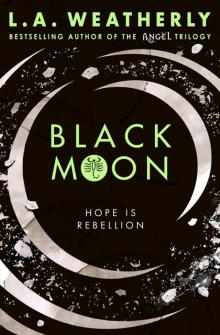 Black Moon
Black Moon Angel
Angel Angel Fire
Angel Fire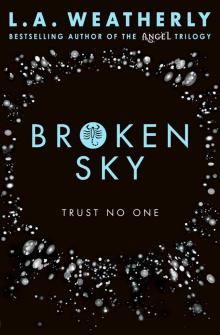 Broken Sky
Broken Sky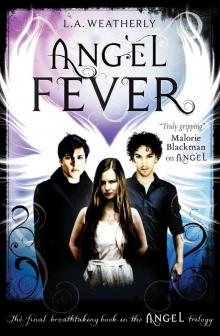 Angel Fever
Angel Fever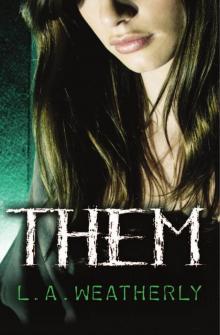 Them
Them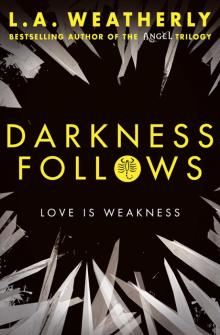 Darkness Follows
Darkness Follows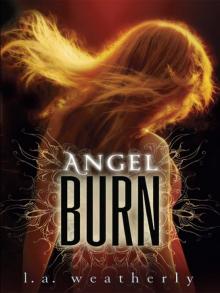 Angel 2 - Burn
Angel 2 - Burn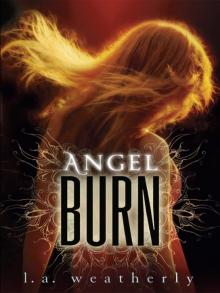 Angel Burn
Angel Burn